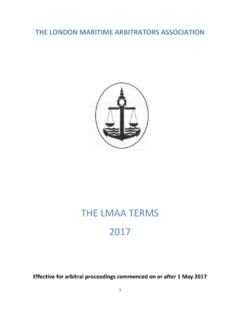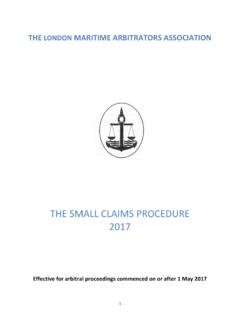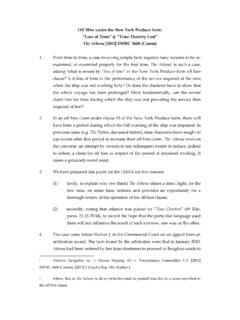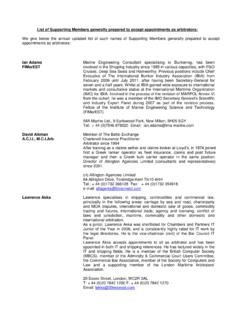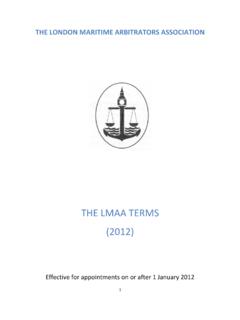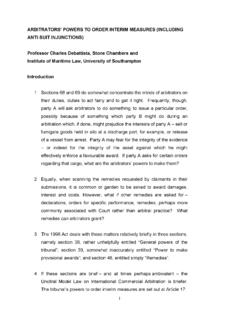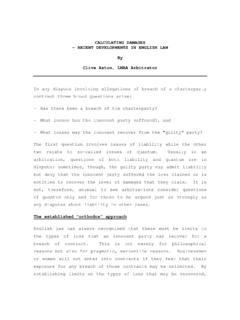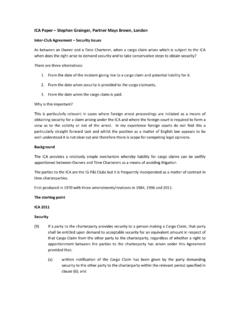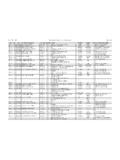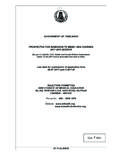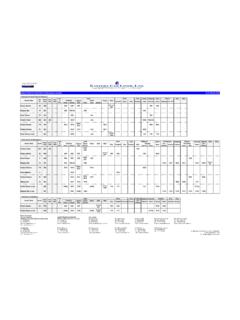Transcription of LMAA 2017 Terms
1 1 lmaa 2017 Terms EXPLANATORY NOTE 1 February 2017 INTRODUCTION 1. This note identifies the main changes to the lmaa Terms 2012 which have been made in the lmaa Terms 2017 , due to come into effect for appointments on or after 1 May 2017 . It also deals with revisions to the lmaa Small Claims Procedure ( SCP ) and to the lmaa Intermediate Claims Procedure ( ICP ), due to come into effect on the same date. 2. The committee responsible for revising the Terms was much assisted by suggestions received from the two Supporting Members Liaison Committees and users of lmaa arbitration about possible revisions. The committee has reviewed all such suggestions, together with numerous other proposals, in preparing the lmaa Terms 2017 . 3. In considering revisions, the committee was guided by three main precepts. a. The lmaa Terms provide for a light touch approach, which should be maintained. The Terms set out a framework covering key aspects of lmaa arbitration, whilst leaving considerable scope for the parties and tribunals to adopt procedures to suit the particular case.
2 The committee s view was that this light touch approach should be maintained, and that a proliferation of new rules and guidelines would be likely to detract from the efficiency and cost-effectiveness of lmaa arbitration. The committee also took the view that some procedures ( appointment of an emergency arbitrator) which apply to arbitrations administered by institutional bodies are not appropriate in the lmaa context. b. If it ain t broke, don t fix it . The lmaa Terms 2012, supplemented by the SCP and ICP, appear to have worked well for a large number of arbitrations covering a wide range of disputes. The committee took a cautious approach to changing rules which have generally operated satisfactorily in practice. 2 c. However, the lmaa cannot be complacent about its procedures. There remains significant scope for parties and tribunals to improve the efficiency and cost-effectiveness of lmaa arbitration.
3 In some cases, this is a matter of better understanding, and use of, existing rules and guidelines. In other cases, it is a matter of making incremental improvements to those rules and guidelines. lmaa Terms 2017 4. Paragraph 10: Specific reference is now made to of the Arbitration Act 1996 ( the Act ), under which an arbitrator appointed by one party can become a sole arbitrator, in circumstances where the other party fails to appoint an arbitrator. 5. Paragraph 11: The Terms now provide for appointment by the President of the lmaa where there has been a failure to comply with an arbitration agreement for arbitration by a sole arbitrator. 6. Paragraph 16(b)(i): In the light of suggestions made for revision, the committee considered whether provision could be made for consolidation of arbitration proceedings, but concluded that this was not possible. However, it took account of concerns about the efficiency of concurrent proceedings ( a chain of charter/sub-charter arbitrations), and decided to provide for an express power that time limits for submissions can be abbreviated or modified where arbitrations are concurrent.
4 7. Paragraph 28: Given current debates in the arbitration world about publication of awards, the committee considered whether any revision was needed to deal with this topic. It was decided that this was not necessary, since paragraph 28 strikes a reasonable balance regarding publication. FIRST SCHEDULE: lmaa Terms 2017 8. Section (D) Paragraph 1(a) and Section (E) Paragraph 3: Paragraph 1(a) of Section (D) of the First Schedule provides for booking fees to be invoiced to the party asking for the hearing. Paragraph 3 of Section (E) of the First Schedule provides for requests 3 for security for a tribunal s costs to be addressed to the party requesting a hearing. The committee considered whether the wording referring to a party asking for a hearing should be changed, since it sometimes leads to disputes about who should pay booking fees, and who should secure a tribunal s costs.
5 It was decided that a change was not appropriate, and that other formulations would not necessarily be better. Paragraph 1(a) of Section (D) already provides a tribunal with a discretion regarding the party to be invoiced for booking fees. In relation to paragraph 3 of Section (E), similar provision is now made regarding a tribunal s discretion to decide who should provide security for the tribunal s costs. It was not considered helpful to prescribe how such a discretion should be exercised. 9. Section (E) Paragraphs 1 to 4: The committee decided that the Terms should be clearer as to the timing of a request by a tribunal for security for its costs. Accordingly the revised Terms provide that (a) the tribunal can request such security whenever it considers it appropriate to take this step, and (b) the tribunal can stipulate when such security is to be provided, with a long stop deadline of 21 days before the start of the hearing (or in the case of a documents-only arbitration no later than immediately before the tribunal starts reading and drafting with a view to producing an award).
6 The tribunal is to inform parties of its total estimated costs no later than 28 days before the security must be in place ( ), and may suspend work, as well as vacating hearing dates, if there is a failure to provide security ( ). 10. Section (E) Paragraph 8: For the avoidance of doubt, it is provided that a failure to comply with an order of a tribunal as to security for its costs can give rise to a peremptory order pursuant to of the Act, and that non-compliance with a peremptory order in such circumstances can lead to dismissal of a claimant s claim. SECOND SCHEDULE: lmaa Terms 2017 11. Paragraph 1: From time to time parties fail to appreciate that documents accompanying statements of case must be provided to other parties. This point has now been specifically addressed. 4 12. Paragraph 5: In order to avoid an unnecessary proliferation of submissions, it is now stipulated that, following service of a reply (or if there is a counterclaim, reply to defence to counterclaim), parties must obtain permission from a tribunal if they wish to serve further submissions.
7 13. Paragraph 7: This paragraph incorporates guidance previously issued in relation to the lmaa 2012 Terms , to the effect that, whilst it will not normally be appropriate for an application for security for costs to include provision for the costs of a tribunal (because this is a matter which the tribunal can address separately under Section (E) of the First Schedule), an application may provide for security for costs already paid to a member of a tribunal by the party seeking security for costs, or in relation to tribunal costs already secured by the party seeking security. 14. Paragraph 11: Sub-paragraph (b) is based on guidance previously issued in relation to the lmaa 2012 Terms , and provides for tribunals to make procedural directions, and to take appropriate action regarding the future conduct of proceedings, after allowing the parties 21 days following exchange of Questionnaires to agree on directions.
8 15. Paragraph 13: This paragraph imposes an express obligation on parties and tribunals to actively consider ways to make the arbitral process as cost-effective and efficient as possible, and to take account of the guidance given in the lmaa Checklist ( the Checklist ), which is now incorporated as Schedule 4. 16. The aim of this provision is to encourage a pro-active approach to efficiency, and to ensure that, where appropriate, parties take account of the detailed guidelines provided in the Checklist. 17. Paragraph 19(b): This paragraph makes it clear that a tribunal, when dealing with costs, will be entitled to take account of unreasonable or inefficient conduct, including non-compliance with the Checklist, thereby providing a further incentive for parties to conduct proceedings efficiently and to take account of the Checklist. A tribunal may also take into account the costs estimates provided by both parties in the lmaa Questionnaire.
9 5 18. The paragraph also makes it clear that a tribunal will be entitled to take account of offers made without prejudice as to costs, and that the English High Court regime as to Part 36 offers does not apply to lmaa arbitration. 19. Paragraph 20: Difficulties can arise where a party delays in giving notice of appointment of legal or other representatives, or delays in giving notice of a change in representation. Accordingly, there is now provision for parties to give prompt notice of such developments. It is also made clear that, absent exceptional circumstances, late instruction of representatives, or a change in representation, will not be regarded as a valid ground for delaying progress in an arbitration or for an adjournment. 20. Paragraph 21: Issues sometimes arise as to the status of an order or direction agreed by the parties, where the parties have agreed the order or direction is deemed to be an order or direction of the tribunal.
10 For the avoidance of doubt, a new provision has been inserted which provides that the parties must notify the tribunal of such an agreement and, unless otherwise ordered by the tribunal, the agreed order or direction shall take effect as an order or direction of the tribunal, and shall be an order or direction of the tribunal for the purpose of section 41 of the Act, which deals with the tribunal s powers in the event of a default by a party. 21. Paragraph 22: Debates from time to time occur about whether parties and tribunals are permitted to depart from the provisions of the Second Schedule. It is now provided that parties are at liberty to apply for directions which differ from those in the Second Schedule, but that they must explain clearly why it is suggested that a different course should be followed. THIRD SCHEDULE: lmaa Terms 2017 22. The Third Schedule, setting out the lmaa Questionnaire, now incorporates guidance previously issued in relation to the lmaa 2012 Terms which emphasises the importance of the Questionnaire as a tool of case management, and explains how particular questions should be dealt with.
